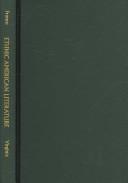| Listing 1 - 3 of 3 |
Sort by
|

ISBN: 9780813925592 9780813925608 0813925592 0813925606 Year: 2006 Publisher: Charlottesville, Va University of Virginia Press
Abstract | Keywords | Export | Availability | Bookmark
 Loading...
Loading...Choose an application
- Reference Manager
- EndNote
- RefWorks (Direct export to RefWorks)
Comparative literature --- Thematology --- American literature --- Bereavement in literature. --- Ethnic groups in literature. --- History in literature. --- Identity (Psychology) in literature. --- African American authors --- History and criticism. --- Jewish authors --- Mexican American authors --- Minority authors --- Bereavement in literature --- Ethnic groups in literature --- History in literature --- Identity (Psychology) in literature --- English literature --- Agrarians (Group of writers) --- African American authors&delete& --- History and criticism --- Jewish authors&delete& --- Mexican American authors&delete& --- Minority authors&delete&
Book
ISBN: 9780801450877 Year: 2012 Publisher: Ithaca London Cornell University Press
Abstract | Keywords | Export | Availability | Bookmark
 Loading...
Loading...Choose an application
- Reference Manager
- EndNote
- RefWorks (Direct export to RefWorks)
Jews in literature --- Joden in de literatuur --- Jodendom in de literatuur --- Judaism in literature --- Judaisme dans la littérature --- Juifs dans la littérature --- Roth, Philip, 1933- . Portnoy's Complaint --- American literature --- Jews --- Judaism and literature --- Literature and Judaism --- Literature --- English literature --- Agrarians (Group of writers) --- Jewish authors&delete& --- History and criticism --- Intellectual life --- History --- Jewish authors --- United States --- 20th century --- 21st century --- Roth, Philip, 1933-2018. Portnoy's Complaint --- Ozick, Cynthia --- Criticism and interpretation --- Goodman, Allegra --- Kushner, Tony --- Segal, Lore --- Shteyngart, Gary
Book
ISBN: 080146448X 0801464013 9780801464010 080145087X 9780801450877 9780801450877 132250511X 9780801464485 Year: 2012 Publisher: Ithaca : Cornell University Press,
Abstract | Keywords | Export | Availability | Bookmark
 Loading...
Loading...Choose an application
- Reference Manager
- EndNote
- RefWorks (Direct export to RefWorks)
In Race, Rights, and Recognition, Dean J. Franco explores the work of recent Jewish American writers, many of whom have taken unpopular stances on social issues, distancing themselves from the politics and public practice of multiculturalism. While these writers explore the same themes of group-based rights and recognition that preoccupy Latino, African American, and Native American writers, they are generally suspicious of group identities and are more likely to adopt postmodern distancing techniques than to presume to speak for "their people." Ranging from Philip Roth's scandalous 1969 novel Portnoy's Complaint to Gary Shteyngart's Absurdistan in 2006, the literature Franco examines in this book is at once critical of and deeply invested in the problems of race and the rise of multicultural philosophies and policies in America.Franco argues that from the formative years of multiculturalism (1965-1975), Jewish writers probed the ethics and not just the politics of civil rights and cultural recognition; this perspective arose from a stance of keen awareness of the limits and possibilities of consensus-based civil and human rights. Contemporary Jewish writers are now responding to global problems of cultural conflict and pluralism and thinking through the challenges and responsibilities of cosmopolitanism. Indeed, if the United States is now correctly-if cautiously-identifying itself as a post-ethnic nation, it may be said that Jewish writing has been well ahead of the curve in imagining what a post-ethnic future might look like and in critiquing the social conventions of race and ethnicity.
Jews in literature. --- Judaism in literature. --- Jews --- Judaism and literature --- American literature --- Literature and Judaism --- Literature --- Intellectual life. --- History --- Jewish authors --- History and criticism.
| Listing 1 - 3 of 3 |
Sort by
|

 Search
Search Feedback
Feedback About UniCat
About UniCat  Help
Help News
News